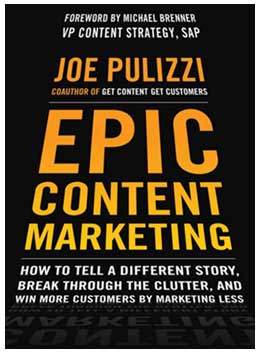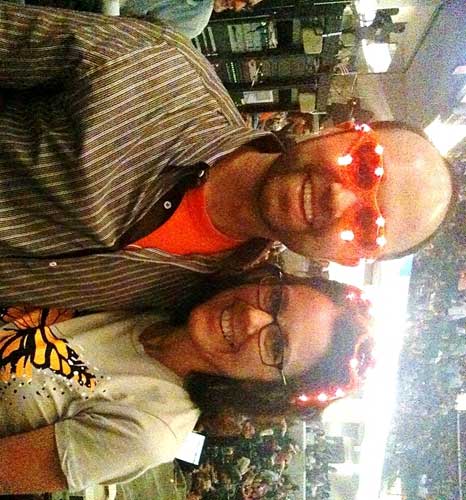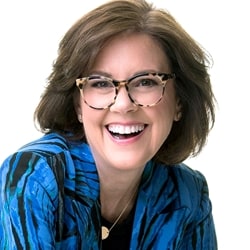My friend Joe Pulizzi today releases a new book on the evolution of content and marketing. Joe is the founder of the Content Marketing Institute, and his new book is called Epic Content Marketing: How to Tell a Different Story, Break through the Clutter, and Win More Customers by Marketing Less.
To me what's most significant about it is what's not in it, as much as what is in it.
Gone are the chapters explaining how the world has changed—how increasingly we need to be attracting customers to us instead of chasing after them—and explaining the value of content as a cornerstone of marketing. (All of that Joe covered in his previous book, and C.C. and I wrote about in Content Rules, too.)
You know how the first few chapters of a book so often always spill a lot of ink setting up the main point of the book itself—you know, the one you've already bought? Anyway, you don't have to worry about that in this case.
 That's because the notion of content at the heart of marketing has evolved. Many marketers these days already have corporate buy-in for content marketing. They have resources and budget. They know they need to tell their story to connect with customers. Or, at the very least, marketers know they have to get there.
That's because the notion of content at the heart of marketing has evolved. Many marketers these days already have corporate buy-in for content marketing. They have resources and budget. They know they need to tell their story to connect with customers. Or, at the very least, marketers know they have to get there.
Of course, content marketing is still hard. It still requires a new way of thinking, new skills, and new processes. Or, as Joe says below, "Content marketing is still the oldest marketing discipline still in early adoption phase."
Here's our conversation...
We're riding in an elevator. Give me the we-only-have-a-few-floors value prop: What problem does Epic Content Marketing solve?
Epic Content Marketing is for the small business owner to the Fortune 500 CMO who is creating and distributing content to try to attract and retain customers… except that the attract and retain part isn't happening—at all. Oh, and it has lots of examples. Like over 100.
So why "epic"? What do you mean by "epic content," exactly?
According to dictionary.com, the sixth of six definitions cites "epic" as "of heroic or impressive proportions; an epic voyage." This is the definition I focus on for this book. And I have a whole chapter on the six principles of epic content marketing, but here's the short version: There was a time when just good content could accomplish our marketing goals. That time has passed. Today, to truly move our customers to action, our content has to be best of breed; it has to truly rise above the rest of the clutter.
Six years ago—even three years ago—we could get by with just "good enough." Not any more.
Is all "good" content "epic"?
I think I just answered that. But seriously... this is all subjective, depending on your definitions. But [merely] "good" content just fills space. What company wants to do that?
Brand storytellers need to inspire. They need to be indispensable. There are just too many other options for customers today to choose from not to be. That, and the fact that all the barriers to epic content creation have been torn down; we don't have any more excuses to give.
Is any company capable of truly epic content? Or do you think the term aspirational?
I really want to say "if Marcus Sheridan can do it, anyone can," but he's already said that himself. Epic content is not born, it is made. It also does not have anything to do with size or budget. Of all the marketing in the world, it is the most democratic.
What's the biggest obstacle to creating epic stuff?
There are a few. Most often, it's lack of patience. Most content marketing fails because it stops. Marketers have such a campaign focus on our content programs that we want instant gratification. If you want results tomorrow, buy some pay-per-click or direct market.
The other is that brands try to boil the ocean with their content. Instead of "one size fits all" content, we really need to find the content niche or story where we can be the leading informational provider in our industry.
Just look at two corporate blogs in the same industry. You could switch content from the sites and most likely no one would notice. That's a problem, and it means you don't have a unique story or you haven't found the bigger story you are playing in.
We just finished up the 3rd annual Content Marketing World in your hometown of Cleveland. What was the biggest change you noticed this year, compared with prior years?
The biggest change is that we are beyond the experimentation phase. The majority of attendees that were at CMW had corporate buy-in for content marketing, had budget, and were seriously looking to take the next step with their corporate story. Long story short, we are maturing as an industry.
That said, content marketing is still the oldest marketing discipline still in early adoption phase. ;)
What surprised you about this year's event? Anything?
My surprises: (1) the number of international attendees; (2) that most people really loved Cleveland; (3) that my orange shoes have a brand unto themselves; and (4) that William Shatner is a close-talker and one of the nicest people you'll ever meet.
We are just about to release our jointly produced content marketing research. What was the biggest surprise to you in the 2014 B2B research?
It's not a surprise, but I love the finding that while literally every company in the world is doing some kind of content marketing, way less than half do not have any kind of documented content marketing strategy. Ouch.
No wonder there is so much horrid corporate content out there. How do they know where the proverbial ship is heading?
Do you think every company should be a publisher?
Every company is already a publisher. But there are two types... those that know it and those that don't.
If you weren't the Godfather of Content Marketing, what would you be?
Does that make you the Godmother of Content Marketing—or the queen? I want to answer like Will (Matt Damon) did in the movie, Good Will Hunting: "I want to be a shepherd. I want to move up to Nashua, get a nice little spread, get some sheep, and tend to them."
The honest answer is that I'd probably be a preacher.
What's your most prized possession on your desk?
It changes, but today I would say Billy Beane's rookie baseball card. For those who don't know Billy Beane, his story was told in the movie Moneyball, starring Brad Pitt. It reminds me that any person, anywhere, with literally no resources, can change the world for the better with a plan, focus, and relentless patience.

Joe Pulizzi and Ann Handley




